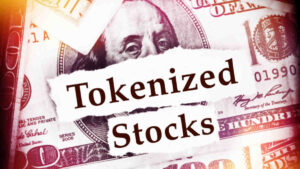Aussie-founded crypto betting company BetU up 16x from ICO

Pic: DKosig / iStock / Getty Images Plus via Getty Images
The third time’s been the charm for an Australian entrepreneur in Bali who is building his own crypto platform after working on two other projects that failed to deliver on their promises.
BetU is trying to take a piece of the US$391 billion global sports betting market. Its token is up from US8c at launch on September 7 to US25c yesterday, giving the Binance Smart Chain coin a market cap of US$26.8 million and making it the No. 666 crypto.
“When I came up with the idea, I was surprised that no one was actually doing it yet, because to me it makes sense, especially with peer-to-peer betting,” chief executive Paul Rogash told Stockhead recently.
In addition to being its own bookmaker, the platform will allow people to be their own betmaker and set the terms of any bet. Wagers are placed in BetU tokens and locked in a smart contract.
“To have one standard betting currency actually makes a lot of sense for a platform,” Rogash said.
The platform won’t immediately be open to sports wagering in Australia, because the 21-person company is still working on licensing, but it will offer fantasy betting. Players will place bets on sports using “fantasy money”, with rewards for the players who win the most.
“It’s just a fun game for everyone, and we think we can attract tens of thousands of users like that from the airdrop community, especially in crypto – I’m sure you know, they’re desperate to make a little bit of money in different places in the world,” Rogash said.
Deflationary supply
For sports betting, 25 per cent of bookmaking margin will be burnt, reducing token supply, with another 25 per cent going to fund the fantasy games. The other 50 per cent will go towards BetU the company, Rogash explained.
For peer-to-peer bets, one per cent will go to the platform – with a quarter of that one per cent being burnt, one quarter going to charity and half going to the company.
“There’s a lot of opportunity for us in terms of increasing the token value,” Rogash said. “We’re in a really awesome position because if, say, for example you’re talking a DeFi project, it’s quite limited in terms of what they can do.
“Whereas with us, because we’re in sport and esport, pretty much any sporting event is relevant to our business.”
BetU will initially focus on European sports betting, and then try to acquire licences in the US state-by-state, Rogash said.
BetU will use data from leading industry provider Betradar to determine most bet outcomes.
For peer-to-peer bets on obscure topics, there’ll be an “honest bet system”, with those posting the bet having to place a 30 per cent “honesty reserve”. If there’s a dispute about the winner, the bet will be kicked to referees who will decide the outcome, and the person who posted the bet could lose both the bets and their reserve if it’s ruled they were trying to cheat the system.
“That’s obviously down the track a little bit,” Rogash said.
Up to 16x return for ICO investors
The platform had a pre-sale in which tokens were sold at US2c and 1.5c.
“Everyone’s done really well, which I’m just relieved about,” Rogash said of his initial investors.
“I’ve got a good grasp on how crypto works in terms of what marketing and what you need to do. It’s very simple, really, you need to get to the right influencers pitching it, and get some excitement.
“Crypto’s so much as about psychology, people want to be on a winner,” Rogash said.
“Buyers are lazy, they just want to be told what to buy, they don’t want to do all the research. … but obviously you’ve got to believe in the project as well, and that’s where I believe in a lot of the transparency and keeping them honest, and even if there’s a setback or something, update the community and what’s happened.”
Sharder and Cashaa
A 37-year-old Echuca, Victoria, Rogash has a background in marketing, previously working on SEO for US law firms and an online machinery marketplace. But he says the latter was pretty self-sufficient and the latter wasn’t the most exciting, leading him to get involved in crypto.
In 2018 he took over the marketing for a decentralised file storage project called Sharder and helped that coin go 30x in just three months.
“But then they couldn’t deliver the technology and I found out that the devs, the actual owners sort of ran out of money, so I had to get out of that, which was disappointing.”
Sharder tokens were trading for 0.051c yesterday, down from 2c in 2018, with a tiny market cap of just US$1.5 million. (Rogash wrote about his Sharder journey in more detail here).
In December, Rogash got involved in Cashaa, which was aiming to offer bank accounts in the United States where people could buy and sell crypto.
“I was really excited about that, we took that 25x in the first two months, and then we to end of January, we’re meant to release it … and then February, I’m like, what’s going on, and they’re saying, next week, next week, next week. And then it got to March, and they said, it’s off the table for the foreseeable future.
“The owners must have known they weren’t going to release it in February, but they didn’t tell me they weren’t going to release it.”
As soon as he found out they weren’t going to release the platform, Rogash said he quit the project.
“Yeah, it’s just pretty disappointing, when you put in so much work and it does go so well,” Rogash said.
He added that he’s still one of the biggest holders in Cashaa.
“I haven’t sold because I knew if I sold, that would just collapse it, and yeah, it’s obviously just shooting myself in the foot, but it’s sort of a moral thing… You know, when people are putting their hard-earned money into something that you’re pitching, and then it’s not actually true, what I was saying, it’s just very disappointing.”
For this project, Rogash is managing it all himself. He’s joined in management by several other Aussies with business backgrounds, with developers in Vietnam and France and a social marketing team in the US and in Bali.
“It’s been an up and down rollercoaster, unfortunately, that’s why I’m just so pumped with this. You know with the advertising and marketing and things we can do – I think we’re gonna go really, really well,” he said.
Related Topics
UNLOCK INSIGHTS
Discover the untold stories of emerging ASX stocks.
Daily news and expert analysis, it's free to subscribe.
By proceeding, you confirm you understand that we handle personal information in accordance with our Privacy Policy.








